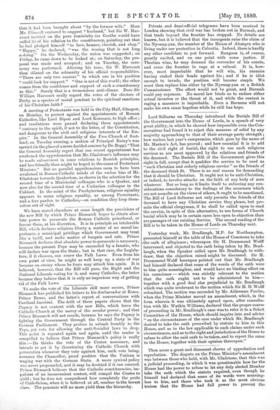Yesterday week, Mr. Bradlaugh, M.P. for Northampton, presented himself at
the table of the House of Commons to take the oath of allegiance ; whereupon Sir H. Drummond Wolff intervened, and objected to the oath being taken by Mr. Brad- laugh, when the Speaker called upon Mr. Bradlaugh to with- draw, that the objection raised might be discussed. Sir H. Drummond Wolff hereupon pointed out that Mr. Bradlaugh had himself declared that some of the words of the oath were to him quite meaningless, and would have no binding effect on his conscience — which was strictly relevant to the motion that the oath ought not to be administered to him— together with a good deal else prejudicial to Mr. Bradlaugh which was quite irrelevant to the motion which Sir H. D. Wolff submitted. The motion was seconded by Mr. Alderman Fowler, when the Prime Minister moved an amendment, which, in the form wherein it was ultimately agreed upon, after consulta- tion with Mr. Watkin Williams, declared that the proper course of proceeding in Mr. Bradlaugh's case was to refer it to a Select Committee of the House, which should inquire into and advise "on the circumstances of the case under which Mr. Bradlaugh desired to take the oath prescribed by statute to him in this House, and as to the law applicable to such claims under such circumstances, and as to the right and jurisdiction of the House to refuse to allow the said oath to be taken, and to report the same to the House, together with their opinion thereupon."


































 Previous page
Previous page